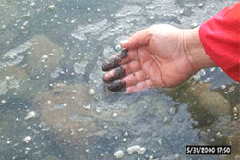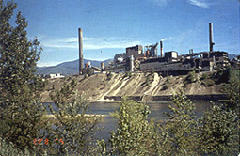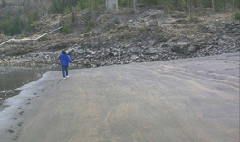Liability Crosses Borders
Air Date: Week of January 11, 2008

Smelter waste at a public beach in Northport, Washington. (Photo: Patti Bailey)
A lawsuit brought by Indian tribes in Washington State has made new law. The law says companies outside the U.S. may be held responsible for pollution they cause in the U.S. The decision troubles some corporations but the tribes wonder when it will lead to cleanup of a century’s worth of waste from the world’s largest lead and zinc smelter in Canada. Living on Earth’s Ingrid Lobet reports.
Transcript
CURWOOD: We stick with the legal issues for this next story. It's now the law that industries outside the United States, whose emissions flow or drift into the U.S., can be held liable for the damage they cause. The Supreme Court has let stand an appeals court ruling to that effect.
And Indian tribes in Washington State now hope that brings them one step closer to a massive cleanup of the Columbia River near the Canadian border. Living On Earth's Ingrid Lobet reports.
[MUSIC: Alan Jackson “USA Today” from What I Do (BMG Music 2004)]
LOBET: Where the Columbia River enters the United States, radio stations play country and western, and the ads are for outdoor gear and ammunition. Big belly mountains rise and then ebb into valleys.
[SOUND OF WATER]
LOBET: The biggest valley of all belongs to the Columbia River. And on the reservation side of the river, a Colville tribe environmental official named Patti Bailey, picks red willow shoots from the blackish river bank.
BAILEY: This is a tribal campground on the Colville reservation. It's an area used for thousands of years by tribal members as a hunting and fishing area. Now I come here to collect red willow.
LOBET: She holds the willow stem in her teeth and strips the core with a knife.
BAILEY: I'm a basket weaver. In my adult life I learned how to weave baskets. We're trying to keep that tradition alive. It's not uncommon for people to put materials in their mouth and hold it there while they're weaving.

Smelter waste at a public beach in Northport, Washington. (Photo: Patti Bailey)
Most of the discharges stopped more than a decade ago, but the Colville and Spokane tribes here have been trying for years to find out the ecological and human health risks of the material. Don Hurst is a geologist and toxic cleanup manager with the tribes.
HURST: What we're looking at here is about 73 percent slag that is sourced from the Teck Cominco smelter.
[SOUND OF GLASSY SLAG]
HURST: Contaminants of concern are like lead, arsenic, zinc, copper. The concentrations of arsenic and lead are at about the same levels that have driven emergency cleanups in other locations.
BAILEY: You know, there's all kinds of animals that use this area. There’s raccoons, and river otters, deer, bear. And lots of animals that the tribes do consume.

The Trail Teck Cominco facility, British Columbia, Canada. (Courtesy of Colville Confederated Tribes)
Now their worries have been confirmed. The Supreme Court has let stand a 9th Circuit ruling that the metals giant Teck Cominco can be sued in U.S. courts using Superfund law.
Dave Godlewski, vice president of environmental and public affairs for Teck Cominco American, says that's a big deal.
GODLEWSKI: I think the implications are really far reaching. They extend to border countries, certainly Mexico and Canada, but I guess could be applied universally. One of our attorneys brought up the potential for island countries in Polynesia to sue the U.S. because of greenhouse gas emissions. It really opens an interesting door to the prosecution of cases that involve transnational transmission of pollutants.
LOBET: Godlewski says it's most important to realize that just because the company fought U.S. jurisdiction, doesn't mean it won't clean up its legacy along the Columbia River.
GODLEWSKI: That's a message that's often lost in all the rhetoric around this, that we have made a commitment to do what is the right thing here, to take our responsibilities very seriously. And I think that is the message I would like to leave with your listeners. That this isn't the case of a recalcitrant polluter. This is someone who is taking responsibility for its actions but felt it was necessary to defend itself with regard to these larger jurisdictional issues.

This is a popular "black sand" beach near the Canadian border that many people use for fishing and swimming. The black sand is slag from the Teck Cominco smelter facility. (Photo: Patti Bailey)
LOBET: But the long fight has made some tribal leaders wary. Again Patti Bailey:
BAILEY: They’ve sat on our watershed boards. They’ve sat across the table from us and talked to us about them cleaning up their industry in Canada, and that’s been wonderful. But they've had decades to do the right thing down here and they haven't done it. And they won't do it until they’re made to.
LOBET: First the facts and history of Teck Cominco's legacy will probably have to be argued in federal court in Washington state. But in the meantime, there is progress in answering the tribes' health and wildlife concerns. The metals company is working with EPA on the large job of gathering data and gauging risk.
Some earlier tests indicate possible problems for wildlife. Marc Stifelman, an EPA toxicologist, says one example is the bottom-dwelling fish known as ‘suckers.’
STIFLEMAN: One of the things we found is the suckers we sampled in the upper reaches of the river: their guts were literally filled with slag. And we're actually having to adjust our analytical procedures for the fish. It was to such a degree that we’re actually having to dissect the entire gastrointestinal tract out of these suckers and separate it from the rest of the fish tissue, because it has such a large mass of slag.
LOBET: Neither the health or liability questions on the upper Columbia are settled, but the case has now made law that could be felt elsewhere, where pollution, heedless, crosses borders. For Living On Earth, I'm Ingrid Lobet.
Links
LOE: U.S. Indian Tribes Challenge Canadian Company’s Legacy of Waste
Living on Earth wants to hear from you!
Living on Earth
62 Calef Highway, Suite 212
Lee, NH 03861
Telephone: 617-287-4121
E-mail: comments@loe.org
Newsletter [Click here]
Donate to Living on Earth!
Living on Earth is an independent media program and relies entirely on contributions from listeners and institutions supporting public service. Please donate now to preserve an independent environmental voice.
NewsletterLiving on Earth offers a weekly delivery of the show's rundown to your mailbox. Sign up for our newsletter today!
 Sailors For The Sea: Be the change you want to sea.
Sailors For The Sea: Be the change you want to sea.
 The Grantham Foundation for the Protection of the Environment: Committed to protecting and improving the health of the global environment.
The Grantham Foundation for the Protection of the Environment: Committed to protecting and improving the health of the global environment.
 Contribute to Living on Earth and receive, as our gift to you, an archival print of one of Mark Seth Lender's extraordinary wildlife photographs. Follow the link to see Mark's current collection of photographs.
Contribute to Living on Earth and receive, as our gift to you, an archival print of one of Mark Seth Lender's extraordinary wildlife photographs. Follow the link to see Mark's current collection of photographs.
 Buy a signed copy of Mark Seth Lender's book Smeagull the Seagull & support Living on Earth
Buy a signed copy of Mark Seth Lender's book Smeagull the Seagull & support Living on Earth

